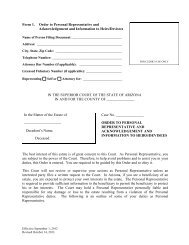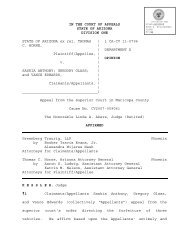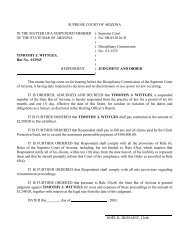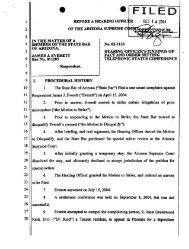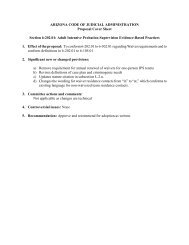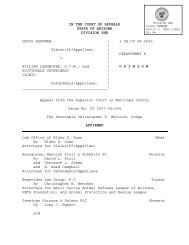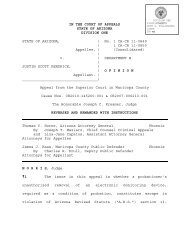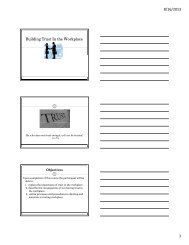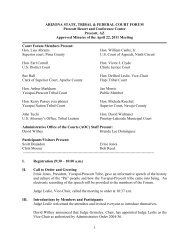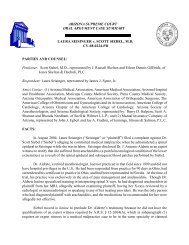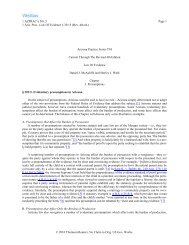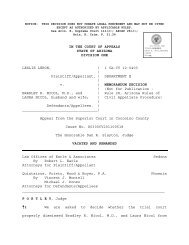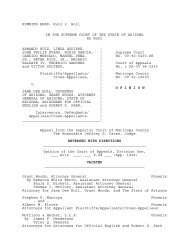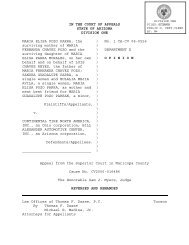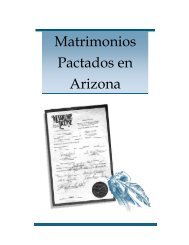Colvin v. Ameri-National - Arizona Judicial Department
Colvin v. Ameri-National - Arizona Judicial Department
Colvin v. Ameri-National - Arizona Judicial Department
Create successful ePaper yourself
Turn your PDF publications into a flip-book with our unique Google optimized e-Paper software.
NOTICE: THIS DECISION DOES NOT CREATE LEGAL PRECEDENT AND MAY NOT BE CITED<br />
EXCEPT AS AUTHORIZED BY APPLICABLE RULES.<br />
See Ariz. R. Supreme Court 111(c); ARCAP 28(c);<br />
Ariz. R. Crim. P. 31.24<br />
GARY COLVIN,<br />
v.<br />
Plaintiff/Appellant,<br />
AMERI-NATIONAL CORPORATION dba<br />
HERITAGE BANK, N.A.,<br />
Defendant/Appellee.<br />
IN THE COURT OF APPEALS<br />
STATE OF ARIZONA<br />
DIVISION ONE<br />
)<br />
)<br />
)<br />
)<br />
)<br />
)<br />
)<br />
)<br />
)<br />
)<br />
)<br />
)<br />
No. 1 CA-CV 10-0528<br />
1 CA-CV 10-0651<br />
(Consolidated)<br />
DEPARTMENT A<br />
MEMORANDUM DECISION<br />
(Not for Publication –<br />
Rule 28, <strong>Arizona</strong> Rules<br />
of Civil Appellate Procedure)<br />
Appeal from the Superior Court in Maricopa County<br />
Cause No. CV 2007-009210<br />
The Honorable J. Richard Gama, Judge<br />
AFFIRMED<br />
Gary <strong>Colvin</strong> Round Rock, TX<br />
Appellant in Propria Persona<br />
Bryan Cave, LLP Phoenix<br />
By Catherine M. Lockard<br />
Attorneys for Appellee <strong>Ameri</strong>-<strong>National</strong> Corporation<br />
and<br />
Zerger & Mauer, LLP Kansas City, MO<br />
By Steven E. Mauer admitted pro hac vice<br />
Attorneys for Appellee Heritage Bank<br />
T I M M E R, Presiding Judge
1 Gary <strong>Colvin</strong> appeals the trial court’s entry of summary<br />
judgment in favor of <strong>Ameri</strong>-<strong>National</strong> Corporation dba Heritage<br />
Bank, N.A. (“Bank”) on his claims that the Bank caused him<br />
damage by failing to immediately provide him cash in exchange<br />
for a validly presented cashier’s check. He additionally<br />
challenges other rulings related to discovery issues and an<br />
award of attorneys’ fees. For the reasons that follow, we<br />
reject <strong>Colvin</strong>’s contentions and therefore affirm.<br />
BACKGROUND<br />
2 On Sunday, May 20, 2007, <strong>Colvin</strong> alleges he entered<br />
into an agreement to purchase a low mileage 2005 Honda Accord<br />
(“Honda”) for $13,500 in cash. <strong>Colvin</strong> had determined that the<br />
Kelley Blue Book value of the vehicle was $24,000, meaning<br />
<strong>Colvin</strong> would have gotten a good deal. To obtain the required<br />
cash and consummate the deal, <strong>Colvin</strong> planned to cash a cashier’s<br />
check for $12,000 he had received in settlement of a dispute<br />
with third party Darcomm Supply (“Darcomm”). On Monday, May 21,<br />
consequently, <strong>Colvin</strong> presented the check for payment at the<br />
Bank’s Tempe branch. A Bank teller told <strong>Colvin</strong> that the Bank<br />
did not usually cash checks and that she could not give him<br />
cash, but that he could deposit the funds into one of the Bank’s<br />
accounts. He explained he did not have an account there, did<br />
not want to deposit the check into his own account, and needed<br />
the cash for a business transaction. <strong>Colvin</strong> then spoke with the<br />
2
anch manager, Patricia McCarty, who, like the teller, informed<br />
<strong>Colvin</strong> she could not cash the check and further informed him<br />
that bank policy precluded cashing a check larger than $1,000<br />
for a non-customer. She suggested he deposit the check into his<br />
personal bank account. <strong>Colvin</strong> advised her that the check was<br />
from a lawsuit involving illegal access to and theft from his<br />
bank account and he would not allow the remitter to discover his<br />
current bank account information.<br />
3 <strong>Colvin</strong> returned home and called the Bank’s Scottsdale<br />
branch. The Bank’s representative told <strong>Colvin</strong> that the<br />
Scottsdale branch likewise could not give him cash for the check<br />
because the bank carried no cash. She told <strong>Colvin</strong> that she<br />
could wire the funds into his personal account or order the<br />
cash, which would be available on Thursday. <strong>Colvin</strong> declined,<br />
again explaining he did not want the remitter of the check to<br />
obtain his account information and that if he did not receive<br />
the cash that day he would be unable to complete a business<br />
transaction, resulting in a loss of more than $10,000. He asked<br />
if a friend could cash the check for him on Thursday, as he<br />
would be out of state, and the Bank representative said only he<br />
could cash the check.<br />
4 <strong>Colvin</strong> asserts he was unable to buy the Honda because<br />
he did not have sufficient cash on hand. On Tuesday, May 22,<br />
therefore, <strong>Colvin</strong> filed a complaint in superior court against<br />
3
the Bank and eventually alleged multiple causes of action. The<br />
Bank subsequently filed a motion for summary judgment and an<br />
offer of judgment in the amount of $15,000. The offer was not<br />
accepted. The court permitted additional discovery pursuant to<br />
<strong>Arizona</strong> Rule of Civil Procedure (“ARCP”) 56(f), and disputes<br />
arose that resulted in <strong>Colvin</strong> moving the court for sanctions,<br />
which the court denied.<br />
5 After the parties completed briefing the summary<br />
judgment issues, the court granted the motion regarding all<br />
claims except three, which were the subject of materially<br />
contested facts. The parties continued to litigate the matter<br />
and, after the court set the matter for trial, the Bank moved<br />
for summary judgment on the remaining claims on the basis, among<br />
others, that <strong>Colvin</strong> had no evidence to support his claim he was<br />
consequentially damaged by not reaping the difference in value<br />
between the purchase price for the Honda ($13,500) and its<br />
Kelley Blue Book value ($24,000). The Bank argued that <strong>Colvin</strong>’s<br />
reliance on his own testimony regarding the Honda’s condition<br />
and its Kelley Blue Book value was insufficient to establish the<br />
value of the Honda. The Bank further asserted that the “book<br />
value” was inadmissible hearsay. <strong>Colvin</strong> responded he could<br />
properly rely on the Kelley Blue Book to establish his losses<br />
and that his interrogatory answers established the vehicle had a<br />
“clean” CARFAX or similar report, had low mileage, and was in<br />
4
“mint” condition. He contended he was not obligated to provide<br />
expert testimony regarding the value of the Honda, and that it<br />
was the Bank’s responsibility to diligently conduct discovery<br />
regarding the condition of the vehicle.<br />
6 The court granted the Bank’s motion, reasoning in<br />
part:<br />
Plaintiff argues that the [Kelley] Blue<br />
Book schedules and on-line listings for<br />
similar vehicles is the evidence he will use<br />
to prove the value of the Honda. However,<br />
those documents are inadmissible hearsay.<br />
. . . [The Kelley Blue Book] might meet a<br />
hearsay exception as a learned treatise if<br />
relied upon by an expert. See Rule 803(18).<br />
However, Plaintiff has not listed any<br />
expert.<br />
. . . .<br />
Plaintiff has not identified any<br />
witness to testify about the value of the<br />
Honda. He intends to prove value through<br />
periodicals, and on-line listings. The<br />
opinion of the authors of the “[Kelley] Blue<br />
Book” or other periodicals or treatises is<br />
hearsay and not admissible evidence.<br />
Without evidence of the value of the Honda,<br />
Plaintiff cannot prove his damages.<br />
One of the elements that Plaintiff must<br />
prove at trial are damages. Because<br />
Plaintiff has no admissible evidence of the<br />
value of the Honda he cannot prove his case.<br />
The court denied <strong>Colvin</strong>’s post-ruling motions seeking a<br />
different result.<br />
7 What transpires next is procedurally messy and ill-<br />
advised. Hill v. City of Phoenix, 193 Ariz. 570, 574, 17, 975<br />
5
P.2d 700, 704 (1999) (“[T]rial judges, in order to avoid<br />
confusion in the appellate process, should not sign separate<br />
judgments in cases in which all claims of all parties have been<br />
adjudicated.”). The court awarded the Bank ARCP 68(d) sanctions<br />
in a signed minute entry that contained ARCP 54(b) language;<br />
this order was entered on June 22, 2010. <strong>Colvin</strong> filed a timely<br />
notice of appeal from that order. The court entered final<br />
judgment on July 15, granting judgment in the Bank’s favor and<br />
awarding $50,000 as reasonable attorneys’ fees and costs, and<br />
again awarded ARCP 68(d) sanctions. On August 7, <strong>Colvin</strong> filed a<br />
timely appeal from the July 15 judgment. Despite this appeal,<br />
the court entered signed orders on August 16 and August 24,<br />
respectively, that awarded $35,000 in attorneys’ fees to the<br />
Bank but was otherwise repetitive of the July 15 judgment.<br />
<strong>Colvin</strong> filed a notice of appeal from these orders on August 27.<br />
We consolidated the appeals.<br />
A. Summary judgment<br />
DISCUSSION<br />
8 <strong>Colvin</strong> argues the trial court erred by granting<br />
summary judgment for the Bank, raising several contentions of<br />
error. We find the issue regarding damages determinative and<br />
therefore address it first.<br />
9 Summary judgment may be granted when “there is no<br />
genuine issue as to any material fact and [] the moving party is<br />
6
entitled to a judgment as a matter of law.” Ariz. R. Civ. P.<br />
56(c). In reviewing a motion for summary judgment, we decide de<br />
novo whether any genuine issues of material fact exist and<br />
whether the trial court properly applied the law. Eller Media<br />
Co. v. City of Tucson, 198 Ariz. 127, 130, 4, 7 P.3d 136, 139<br />
(App. 2000). We view the facts and the inferences to be drawn<br />
from those facts in the light most favorable to the party<br />
against whom judgment was entered. Prince v. City of Apache<br />
Junction, 185 Ariz. 43, 45, 912 P.2d 47, 49 (App. 1996). We<br />
affirm the trial court’s decision if correct for any reason.<br />
City of Phoenix v. Geyler, 144 Ariz. 323, 330, 697 P.2d 1073,<br />
1080 (1985). We will not disturb the court’s decision on the<br />
admissibility of evidence absent a clear abuse of discretion and<br />
resulting prejudice. Gasiorowski v. Hose, 182 Ariz. 376, 382,<br />
897 P.2d 678, 684 (App. 1994).<br />
10 <strong>Colvin</strong>’s claimed damages consisted of direct damages<br />
of $12,000 representing the value of the cashier’s check and<br />
consequential damages for loss of the Honda. Regarding the<br />
latter, <strong>Colvin</strong> sought the difference between the reduced price,<br />
for which he contends he could have purchased the Honda, and the<br />
Kelley Blue Book price for the vehicle. He argues the trial<br />
court erred by ruling that evidence of the Kelley Blue Book is<br />
inadmissible hearsay because the document is generally accepted<br />
as admissible evidence throughout the United States and falls<br />
7
within the hearsay exception recited in Rule 803(17), <strong>Arizona</strong><br />
Rules of Evidence. 1<br />
11 Rule 803(17) includes as an exception to hearsay:<br />
Market quotations, tabulations, lists,<br />
directories, or other published<br />
compilations, generally used and relied upon<br />
by the public or by persons in particular<br />
occupations.<br />
Although <strong>Arizona</strong> courts have not addressed the question, cases<br />
from other jurisdictions establish that the Kelley Blue Book<br />
falls within this exception. See State v. Dallas, 695 S.E.2d<br />
474, 477 (N.C. Ct. App. 2010); State v. Shaw, 86 P.3d 823, 824<br />
(Wash. Ct. App. 2004); Neloms v. Empire Fire & Marine Ins. Co.,<br />
859 So. 2d 225, 232-33 (La. Ct. App. 2003); State v. Erickstad,<br />
620 N.W.2d 136, 145, 32 (N.D. 2000) (citing additional cases<br />
from other jurisdictions); see also Michael A. Rosenhouse,<br />
Annotation,Construction and Application of Uniform Rule of<br />
Evidence 803(17), Providing Hearsay Exception for Market<br />
Reports, and Commercial Publications, 54 A.L.R.6th 593, § 12<br />
(2010). The Bank has provided no authority to the contrary.<br />
Accordingly, discerning no reason to depart from the majority<br />
1 The record does not reflect that <strong>Colvin</strong> explicitly argued to<br />
the trial court that the Kelley Blue Book fell within the Rule<br />
803(17) exception, and he has arguably waived the issue on<br />
appeal. See Scottsdale Princess P’ship v. Maricopa County, 185<br />
Ariz. 368, 378, 916 P.2d 1084, 1094 (App. 1995) (this court<br />
considers only those arguments first presented to the trial<br />
court). Because we decide the court properly granted summary<br />
judgment even assuming the admissibility of the Kelley Blue<br />
Book, we address the hearsay ruling.<br />
8
view, we decide the court erred by excluding evidence of the<br />
Kelley Blue Book. Despite reaching this conclusion, however, we<br />
conclude the court appropriately entered summary judgment in<br />
favor of the Bank.<br />
12 As the plaintiff, <strong>Colvin</strong> bore the burden of<br />
establishing his damages with reasonable certainty. 2<br />
[A]t least $10,000 for the loss of the gain<br />
in value I would have obtained had I been<br />
able to complete the purchase of the low<br />
mileage, mint condition 2005 Honda EX V6 4dr<br />
sedan on May 21, 2007 that had a ‘clean’<br />
CARFAX or similar report (agreed purchase<br />
price was $13,500 and listed retail or<br />
‘private seller’ price was over $24,000 per<br />
Kelly [sic] Blue Book, local advertisements,<br />
Craigs List, and other postings and<br />
advertisments [sic]).<br />
9<br />
Gilmore v.<br />
Cohen, 95 Ariz. 34, 36, 386 P.2d 81, 82 (1963). Merely citing<br />
to the Kelley Blue Book is insufficient to prove the value of<br />
the Honda because value under the Kelley Blue Book depends on<br />
various factors specific to the particular vehicle. The<br />
information in the record regarding the condition of the vehicle<br />
at issue consists solely of a statement by <strong>Colvin</strong> in response to<br />
an interrogatory asking him to describe his damages:<br />
2 <strong>Colvin</strong> argues vigorously in his reply brief that the Bank was<br />
responsible for discovering the condition of the Honda. He also<br />
implies that the Bank’s failure prejudiced his ability to prove<br />
his damages. As the party bearing the burden of proof, however,<br />
it was incumbent on <strong>Colvin</strong> to conduct any necessary discovery,<br />
such as deposing the Honda’s owner or obtaining his affidavit,<br />
to prove the Honda’s condition and value.
Other than state the make, model, and year of the vehicle,<br />
<strong>Colvin</strong>’s statement provides only general information regarding<br />
the vehicle’s condition. Absent is any statement as to specific<br />
mileage, features, accessories, or repairs. Also absent are any<br />
photographs or advertisements describing the vehicle, or any<br />
affidavit by <strong>Colvin</strong> indicating he has actually seen the vehicle<br />
and so is able to testify as to the vehicle’s condition and<br />
features. In sum, <strong>Colvin</strong> failed to produce sufficient<br />
foundation to establish damages through reference to the Kelley<br />
Blue Book value. See Ariz. R. Evid. 602 (“A witness may not<br />
testify to a matter unless evidence is introduced sufficient to<br />
support a finding that the witness has personal knowledge of the<br />
matter.”) Because <strong>Colvin</strong> eventually recovered the $12,000 from<br />
the Bank, see infra 18-22, and he failed to submit sufficient<br />
proof of his alleged consequential damages, the trial court<br />
appropriately granted summary judgment for the Bank on this<br />
alternative basis for all claims. 3<br />
P.2d at 1080.<br />
3 In light of our decision, we do not address <strong>Colvin</strong>’s arguments<br />
concerning the purported limitations placed on his discovery<br />
rights as the limitations did not impact <strong>Colvin</strong>’s ability to<br />
discover evidence of damages. Likewise, we need not address<br />
<strong>Colvin</strong>’s arguments concerning the court’s characterization of<br />
the Bank’s instrument as a “cashier’s check,” the ability of the<br />
Bank to satisfy its obligation by wire transfer, and state of<br />
mind. Even assuming <strong>Colvin</strong>’s arguments are well-taken, because<br />
he failed to prove damages, the court did not commit reversible<br />
error.<br />
10<br />
Geyler, 144 Ariz. at 330, 697
B. Discovery sanctions<br />
13 <strong>Colvin</strong> contends the trial court erred by denying his<br />
two motions for imposition of monetary and more severe sanctions<br />
against the Bank. We review the court’s rulings for an abuse of<br />
discretion. See Jimenez v. Wal-Mart Stores, Inc., 206 Ariz.<br />
424, 426, 5, 79 P.3d 673, 675 (App. 2003).<br />
14 On December 8, 2008, <strong>Colvin</strong> moved the court for<br />
sanctions pursuant to ARCP 37(b)(2) and (d) for “severe<br />
discovery and pleading abuse.” He sought monetary sanctions and<br />
asked the court to strike the Bank’s answer and enter default<br />
judgment against it due to the Bank’s repeated instances of<br />
“false, deceptive and fraudulent testimony,” and deceptive<br />
pleadings. <strong>Colvin</strong> described various sworn statements by two<br />
Bank employees, contrasted those statements with other evidence<br />
gathered by him, and concluded these employees necessarily gave<br />
false and fraudulent testimony. The court denied the motion as<br />
premature.<br />
15 We do not discern an abuse of discretion. Even<br />
assuming <strong>Colvin</strong> identified genuine inconsistencies 4<br />
11<br />
between the<br />
4 A cursory review of the motion casts doubt on <strong>Colvin</strong>’s claims<br />
of inconsistency. For example, in his motion he asserted no<br />
evidence was presented that the Bank ordered and received the<br />
$12,000 cash which he contends proves the falsity of contrary<br />
testimony offered by Senior Vice President of Operations,
testimony of the Bank employees and other evidence, these<br />
discrepancies alone do not demonstrate that the employees<br />
intentionally provided false information or that the Bank itself<br />
engaged in bad acts sufficient to justify monetary sanctions or<br />
entry of default. See Wayne Cook Enters. v. Fain Props. Ltd.<br />
P’ship, 196 Ariz. 146, 147-48, 993 P.2d 1110, 1111-12 (App.<br />
1999) (holding that to impose sanction of dismissal, court must<br />
find the party itself engaged willfully in bad conduct). The<br />
existence and import of these discrepancies is appropriately<br />
addressed at trial where the evidence can be fully vetted and<br />
the witnesses afforded the opportunity for explanation. The<br />
court’s ruling preserved <strong>Colvin</strong>’s ability to move for sanctions<br />
at that time.<br />
16 On February 1, 2010, <strong>Colvin</strong> moved for sanctions based<br />
on allegations of spoliation of evidence and other discovery<br />
abuse. The motion asserted the Bank had wrongly failed to<br />
preserve e-mails relevant to showing a conspiracy between the<br />
Bank and Darcomm. The court struck <strong>Colvin</strong>’s motion without<br />
prejudice to re-urging it depending on the results of a forensic<br />
examination of certain e-mails to determine when they were<br />
created. At the court’s direction, <strong>Colvin</strong> subsequently filed a<br />
notice of the preliminary findings of the forensic expert.<br />
Geraldine Safcik. Branch manager Patricia McCarty testified,<br />
however, that she ordered the cash and that it was delivered.<br />
12
<strong>Colvin</strong> represented that the expert was unable to verify the<br />
authenticity of an e-mail purportedly sent by Darcomm’s<br />
president to the Bank, that the expert could not locate the e-<br />
mail in a Bank employee’s mailbox, and that e-mails were found<br />
dating back beyond the Bank’s claimed retention period. The<br />
court granted the Bank’s motion for summary judgment for lack of<br />
proof of damages without again addressing spoliation. <strong>Colvin</strong><br />
did not re-urge his motion for sanctions based on spoliation of<br />
evidence.<br />
17 <strong>Colvin</strong> argues his expert found “evidence of an<br />
unconscionable policy of e-mail deletion” and an “equally<br />
outrageous data retention and back-up policy,” thereby<br />
justifying relief under the motion. We cannot say the court<br />
abused its discretion. Although <strong>Colvin</strong> filed notice of the<br />
expert’s preliminary report, <strong>Colvin</strong> did not re-urge his motion;<br />
thus, the court had nothing to rule upon. Additionally, because<br />
the record contains no report from the expert, we cannot fault<br />
the trial court for failing to revisit the earlier motion of its<br />
own accord.<br />
C. Stipulation regarding $12,000<br />
18 In Darcomm’s bankruptcy proceeding, <strong>Colvin</strong> accepted<br />
$12,000 from the Bank and surrendered the cashier’s check. He<br />
argues on appeal that he did so pursuant to a “formal<br />
stipulation . . . wherein [the Bank] agreed that his receipt of<br />
13
the monies . . . would not prejudice him in any manner,” in the<br />
superior court lawsuit. <strong>Colvin</strong> argues the trial court erred by<br />
ignoring this stipulation and considering his receipt of the<br />
$12,000 as evidence he was not entitled to double recovery from<br />
the Bank.<br />
19 Transcript excerpts from the bankruptcy proceeding<br />
show the bankruptcy court asked the Bank if it would provide the<br />
$12,000 to <strong>Colvin</strong> in exchange for receipt of the check and<br />
arrange to preserve the cashier’s check for use in pending<br />
litigation. The Bank agreed it would “preserve the instrument,”<br />
and stated that payment would not “have an impact on the<br />
underlying lawsuit” in the superior court. When <strong>Colvin</strong> was<br />
asked if he would accept the funds, <strong>Colvin</strong> stated that he was<br />
willing “as long as there’s no prejudice to me to accept it.”<br />
<strong>Colvin</strong> acknowledged receipt of the funds and the Bank<br />
acknowledged receipt of the check. The court noted that the<br />
payment reduced the amount of <strong>Colvin</strong>’s bankruptcy proof of claim<br />
against Darcomm.<br />
20 Contrary to <strong>Colvin</strong>’s position, the bankruptcy court<br />
agreement did not prohibit the Bank from advising the trial<br />
court of the payment or deducting the payment from any claimed<br />
damages. Construed reasonably, the agreement meant <strong>Colvin</strong> would<br />
not be adversely affected from continuing to seek consequential<br />
14
damages from the Bank even though he received payment of his<br />
direct damages – the $12,000 represented by the cashier’s check.<br />
21 <strong>Colvin</strong> nevertheless contends that the payment he<br />
received was from a joint tortfeasor and that under the doctrine<br />
of joint and several liability, he is entitled to be paid in<br />
full by both Darcomm and the Bank. <strong>Colvin</strong> is mistaken. Even<br />
assuming the Bank and Darcomm are joint tortfeasors and the<br />
doctrine of joint and several liability applied, a plaintiff may<br />
only recover once under that doctrine. Herstam v. Deloitte &<br />
Touche, LLP, 186 Ariz. 110, 115, 919 P.2d 1381, 1386 (App. 1996)<br />
(“Once the victim fully recovered for his injury from one<br />
culpable actor, the victim could not seek another recovery from<br />
any other joint actor.”).<br />
22 The trial court did not err by considering <strong>Colvin</strong>’s<br />
receipt of the $12,000.<br />
D. Attorney fees<br />
23 <strong>Colvin</strong> next contends the trial court violated public<br />
policy by awarding attorney fees that included fees incurred by<br />
out-of-state lawyers unlicensed in <strong>Arizona</strong>. <strong>Colvin</strong> specifically<br />
argues that Steven Mauer, a lawyer unlicensed in <strong>Arizona</strong>, was<br />
responsible for the majority of legal work in the case, and<br />
<strong>Colvin</strong> should not be required to reimburse the Bank for Mauer’s<br />
fees.<br />
15
24 In his declaration in support of the application for<br />
attorney fees, Mauer confirms he is licensed in Missouri and<br />
Kansas and not in <strong>Arizona</strong>, and that he was from the beginning of<br />
the action primarily responsible for representing the Bank.<br />
Mauer was admitted pro hac vice on February 1, 2010. <strong>Colvin</strong><br />
does not contend that Mauer appeared in court or filed documents<br />
in this case prior to his admission pro hac vice. <strong>Colvin</strong><br />
contends, however, that preparing pleadings and advising <strong>Arizona</strong><br />
lawyers constitutes the unauthorized practice of law.<br />
25 Ethics Rule 5.5 provides:<br />
(c) A lawyer admitted in another<br />
United States jurisdiction, and not<br />
disbarred or suspended from practice in any<br />
jurisdiction, may provide legal services on<br />
a temporary basis in this jurisdiction that:<br />
(1) are undertaken in association with<br />
a lawyer who is admitted to practice in this<br />
jurisdiction and who actively participates<br />
in the matter.<br />
Ariz. R. Sup. Ct. 42, ER 5.5(c). This rule authorizes out-of-<br />
state attorneys to provide legal services temporarily in<br />
<strong>Arizona</strong>, provided they associate with active in-state counsel.<br />
The Missouri attorneys, who were members of the same law firm as<br />
<strong>Arizona</strong> counsel, have obviously associated with <strong>Arizona</strong> counsel<br />
in this case. 5<br />
The record clearly shows that, both prior to and<br />
after Mauer’s admission pro hac vice, <strong>Arizona</strong> counsel actively<br />
5<br />
Since May 2011, Mauer has practiced with the law firm of<br />
Zerger & Mauer, LLP.<br />
16
participated in the litigation. Missouri counsel’s assistance<br />
in preparing pleadings and advising <strong>Arizona</strong> counsel did not<br />
constitute the unauthorized practice of law. Consequently, the<br />
court did not violate public policy by awarding fees incurred by<br />
Mauer prior to his admission pro hac vice.<br />
E. Judgments<br />
26 <strong>Colvin</strong> finally argues the trial court erred by<br />
entering the three judgments because the court had not yet ruled<br />
on his motion concerning the Bank’s request for ARCP 68(d)<br />
sanctions and attorney fees and his motion to extend the time to<br />
file a response concerning the court’s summary judgment ruling.<br />
He contends that as a result, he was deprived of the opportunity<br />
to present “the full thrust” of his findings about the unlawful<br />
use of non-licensed attorneys as well as the “full details and<br />
facts” in reference to the stipulation entered into regarding<br />
his acceptance of the $12,000 from the Bank.<br />
27 We reject <strong>Colvin</strong>’s argument for two reasons. First,<br />
his decision to file additional motions did not prevent him from<br />
responding to the Bank’s pending motions. The court afforded<br />
<strong>Colvin</strong> ample opportunity to do so. Second, <strong>Colvin</strong> fails to<br />
demonstrate any prejudice from the timing of the entry of the<br />
judgments. See Creach v. Angulo, 189 Ariz. 212, 214, 941 P.2d<br />
224, 226 (1997) (holding in order to justify reversal error must<br />
be prejudicial to complaining party). We have already<br />
17
determined that the use of attorneys licensed in another state<br />
who provide legal services in association with an actively<br />
participating <strong>Arizona</strong> licensed attorney, as was the case here,<br />
is not unlawful. As for any additional information regarding<br />
the stipulation pertaining to <strong>Colvin</strong>’s acceptance of the<br />
$12,000, <strong>Colvin</strong> argued or at a minimum mentioned this issue in<br />
at least three filings - a motion in limine to exclude any<br />
mention of the receipt of the funds, the motion to extend time,<br />
and <strong>Colvin</strong>’s reply with respect to his motion to strike the<br />
Bank’s motions for sanctions and attorneys’ fees. <strong>Colvin</strong> does<br />
not explain what other details and facts he would have offered<br />
and why he failed to offer them previously. In any event, we<br />
have already explained that <strong>Colvin</strong> cannot collect twice on the<br />
same check. Neither of these arguments would have altered the<br />
result. The court did not commit reversible error.<br />
28 Because the trial court entered three judgments, we<br />
are compelled to clarify the import of these entries. Once the<br />
court entered the June 22, 2010 ARCP 54(b) judgment awarding<br />
ARCP 68(d) sanctions and <strong>Colvin</strong> appealed, the court lost<br />
jurisdiction to make additional rulings concerning those<br />
sanctions. McHazlett v. Otis Eng’g Corp., 133 Ariz. 530, 533,<br />
652 P.2d 1377, 1380 (1982). Consequently, the court lacked<br />
jurisdiction to enter an ARCP 68(d) sanction award in the July<br />
15, 2010 judgment, although this appeal is not substantively<br />
18
impacted as the June 22 judgment reflects the same sanction<br />
amount and that judgment is properly before us in 1 CA-CV 10-<br />
0528. Once the court entered the July 15 judgment, which<br />
finally adjudicated all claims, and <strong>Colvin</strong> timely appealed, the<br />
court lost jurisdiction to act in this case. Id. The court<br />
therefore lacked jurisdiction to enter the August 16 and 24,<br />
2010 judgments, and those judgments are void. Id. <strong>Colvin</strong>’s<br />
appeal from those void judgments is similarly flawed as we lack<br />
jurisdiction to consider void judgments. Id. We therefore<br />
dismiss <strong>Colvin</strong>’s appeal from the August 16 and 24 judgments,<br />
which this court had joined in 1 CA-CV 10-0651 along with<br />
<strong>Colvin</strong>’s appeal from the July 15 judgment.<br />
CONCLUSION<br />
29 For the foregoing reasons, we reject <strong>Colvin</strong>’s<br />
arguments and affirm the trial court’s judgments entered June<br />
22, 2010 and July 15, 2010. We dismiss <strong>Colvin</strong>’s appeal from the<br />
court’s judgments entered August 16 and 24, 2010, as the court<br />
lacked jurisdiction to enter those judgments.<br />
CONCURRING:<br />
/s/<br />
Patrick Irvine, Judge<br />
/s/___________________________<br />
Patricia A. Orozco, Judge<br />
/s/<br />
Ann A. Scott Timmer, Presiding Judge<br />
19



